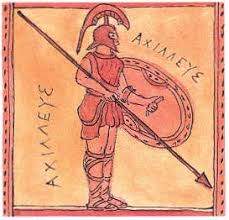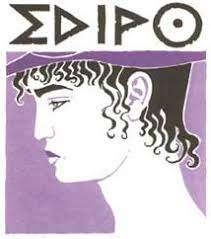Dictionary of complexes

- 3364
- 125
- Herbert Ritchie
In psychology, complexes refer to the set of unconscious feelings, acquired by experiences lived in childhood and influence personality.
The word complex It was first applied to psychology by Carl G. Jung and popularized by the discussion of Freudian psychoanalysis, constitutes current currency in language traffic.
Together with the most widespread knowledge complexes, there are others that have the peculiarity of bear the name of historical characters, mythological figures or protagonists of literary or biblical works (Münchhausen, Cinderella, Agripina, Oedipus, Bovary, Cain, etc.)
Content
Toggle- Adonis complex
- Agar and Sara complex
- Agripina complex
- Alejandro complex
- Antigone complex
- Achilles complex
- Aristotle complex
- Madame Bovary complex or chimera complex
- Brummel complex
- Brunilda complex
- Cain complex
- Casandra complex
- Castration complex
- Cinderella complex
- Creso complex
- Dafne complex
- Oedipus complex
- Electra complex
- Empédocles complex
- Eróstrato complex
- Hamlet complex
- Job complex
- Jonah complex
- Judas complex
- Lolita complex
- Müchausen complex
- Narcissus complex
- Otelo complex
- Peter Pan complex
- Pulgarcito complex
- Wendy complex
Adonis complex
Muscular dysmorphia, also known as vigorexia, inverted anorexia or Adonis complex, is a type of body dysmorphic disorder, in which individuals who experience it have a pathological concern to get a muscular body.
Agar and Sara complex
The agar and Sara complex is suffered by men who tend, unconsciously or not, to classify women into two groups: the group of women hello good, pure and untouchable in the similarity of the mother, and to the bad, A suitable for sexual satisfaction, but unworthy of receiving the love of a man. The name was noted by Freud and baptized by the French psychoanalyst Maryse Choisy, alluding to an episode of the Bible in which Sara, Abraham's wife, asks her to have a child with Agar, her Egyptian slave, since she believes that cannot give it offspring. Agar has a son he will call Ismael, but later Sara also conceives a son, which Isaac will call. Then Abraham expels Agar and his son Ismael of the tribe.
Agripina complex
The Agripina complex has the same meaning as the Oedipus complex, with the difference that in the legend of the king of Thebes, he did not know that he was committing incest. Agripina, on the other hand, if he tried openly to seduce his son Nero.
Alejandro complex
Alejandro's complex is a resentment of the son towards the father, since the father does not "advance" the son towards his professional achievements.
This complex comes from Alexander the Great that on one occasion when his father, Philip of Macedonia, came to celebrate his war triumphs he exclaimed: "My father leaves me nothing to conquer".
As an anecdote to comment that Federico El Grande suffered this complex, and according to his biographies, there is a marked before and after the moment he received the crown. Since before receiving it suffered neurotic attacks and then not.
Antigone complex
According to Greek mythology, Antigone, daughter of Oedipus and Yocasta, dedicated all his life to the care of his parents. The complex describes excessive fixation in the mother's figure and inability to accept the laws of life and love.
Achilles complex
 It is the attempt to hide one's weakness after the appearance of invulnerability and heroism. Achilles, hero of the mythological poem of "the Iliad", is said to be submerged by his mother in the Estigia lagoon to ensure that his body was immune to wounds; However, the heel, where his mother held him, failed to be bathed by magical water and remained vulnerable. The term was first used by the French writer Pierre Audiat.
It is the attempt to hide one's weakness after the appearance of invulnerability and heroism. Achilles, hero of the mythological poem of "the Iliad", is said to be submerged by his mother in the Estigia lagoon to ensure that his body was immune to wounds; However, the heel, where his mother held him, failed to be bathed by magical water and remained vulnerable. The term was first used by the French writer Pierre Audiat.
Aristotle complex
Aristotle, was an eminent Greek philosopher of the S. IV a.C., He was a disciple of Plato and Tutor of Alexander the Great. His encyclopedic writings laid the foundations of all sciences and branches of philosophy.
Aristotle always had a different vision from Plato's, about the theory of human nature, and on more than one occasion, Aristotle had discussions with his teacher, since he tried to impose his theory, that is, make him believe that the correct theory was yours. Hence, at Plato's death he left Athens. He went to Assos, because he did not agree with the fundamental doctrines of the Platonic School, and there, a criticism of Platonism began.
The Aristotle complex is trying to impose your own theory about anything to someone who is better than you, and not being satisfied with his teachings, that is, to believe himself better than him and have an obsession to overcome him.
Madame Bovary complex or chimera complex
Madame Bovary's complex consists in the alteration of the sense of reality, thanks to which the upset is considered a different person from what really is. Called "Bovarismo", derives from the famous novel by Gustave Flaubert "Madame Bovary". The term French psychologist Jules de Gaultier introduced the term, before the advent of Freud and psychoanalysis.
Brummel complex
The Brummel complex explains the fact that excessive elegance in dress compensates in the background a strong feeling of inferiority. The name remembers Jorge Brummer (1778-1840), famous Dandy of the Court of England, who acted as a true fashion dictator of his time.
Brunilda complex
Brunilda's complex refers to the tendency of young women to want. In the case, the man remains the same, changes only the attitude of the woman. In the Germanic legend the Brunilda Walkiria is only willing to marry a male capable of beating her in all kinds of physical exercises. Through a Sigfrido hoax he manages to overcome her and conquer her. Brunilda discovers the deception and demands the death of the offender.
Cain complex
The biblical figure of Cain is invoked to characterize the peculiar psychology of the firstborn, a jealous child of the second son whom he considers as an "intruder" and a rival. The Cain opposes the Abel complex. French psychologist Charles Badouin, the first to use the term writes: "The child who fits a little sister or a little sister, reacts first, very generally, with excessive jealousy and completely animal, which subsists later, latent, latent and more or less well repressed. The hostility of the child against the elder appears as a natural replica to this hostility ".
The child thinks that his mother prefers the baby because he is smaller, so he behaves like a baby. This attitude will normally last a short time, since the child will want to be great to enjoy the advantages of being greater. Parents must be aware that he also has love and care needs.
Casandra complex
Based on the myth of Casandra and the metaphor of the prophecies, the Casandra complex was coined, which is applied in people who usually make predictions, often catastrophic, which are not believed by others. This syndrome is applied mainly in psychology and politics or science, and was named by the French philosopher Gaston Bachelard in 1949.
Castration complex
The castration complex is a concept belonging to psychoanalysis and refers to a structure that breaks into human psyche at an early age, in intimate relationship with the Oedipus complex (approximately three to five years). Basically, it is about the male of the fear of the loss of the phallus (beyond the penis, as a representation of power, superiority and possibility of reunification with the mother) at the hands of her father, and in the woman to the finding that "It has been castrated". The concept was described by Sigmund Freud for the first time in 1908 in the text "Children's Sexual Theories", although it had previously referred ambiguously in 1900 in "The Interpretation of Dreams" as a threat of castration.
Cinderella complex
The Cinderella complex is the compensation prepared by the smallest or little loved child of a family. The least dear son will be the one who will later save thanks to his talent, to the whole family that is in a dramatic situation. In principle this child was placed in a victim situation, but their merits will finally be recognized.
Creso complex
The CRESO complex manifests itself with the sick search for "superiority" through the waste of money and generous gifts.
His name comes from Creso, the name of the last king of Lidia (560-546 to.C.), that of the most fabulous wealth that reminds of history, of the Mermnada dynasty, its reign was marked by pleasures, war and the arts. Creso was born around 595. C ... When his father dwells from Lidia in 560 to. C., Creso conquered Panfilia, Misia and Frigia; In short, he submitted to all the Greek cities of Anatolia to the Halys River (except Mileto), to which he made important donations for his temples. Due to the great wealth and prosperity of his country, he said he was the richest man in his time.
Before the disturbing advance of Persia Ciro II, Creso sent a messenger to the Oracle of Delphi, who replied that if he was driving an army to the east and crossed the Halys River, he would destroy an empire. Encouraged by the oracle, Creso organized an alliance with Nabónido de Babylon, Amosis II of Egypt and the Greek city of Sparta. However, the Persian forces defeated the coalition in Capadocia, in the battle of the Halys River (547 a. C.). In this way the prediction was fulfilled: because of CRESO and his belief in the oracles, his own Empire had been destroyed.
Dafne complex
Fear of young women in sexuality. It is also called "penetration anguish". The Nymph Dafne, in Greek mythology, was persecuted by Apollo. At the moment when the lover God was about to reach it, the nymph became laurel.
Oedipus complex
 In psychoanalysis, the Oedipus complex, sometimes also called Oedipal conflict, It refers to the complex aggregate of children's emotions and feelings characterized by the simultaneous and ambivalent presence of love and hostile desires towards parents. It is a central concept of Sigmund Freud's psychoanalytic theory, exposed for the first time within the frames of its first topic. In general terms, Freud defines the Oedipus2 complex as the unconscious desire to maintain a sexual (incestuous) relationship with the opposite sex and eliminate the same sex (parricide).
In psychoanalysis, the Oedipus complex, sometimes also called Oedipal conflict, It refers to the complex aggregate of children's emotions and feelings characterized by the simultaneous and ambivalent presence of love and hostile desires towards parents. It is a central concept of Sigmund Freud's psychoanalytic theory, exposed for the first time within the frames of its first topic. In general terms, Freud defines the Oedipus2 complex as the unconscious desire to maintain a sexual (incestuous) relationship with the opposite sex and eliminate the same sex (parricide).
The Oedipus complex is the "unconscious representation through which the child's sexual or loving desire is expressed". Freud describes two different constellations in which the oedipal conflict can be presented:
Positive Oedipus Complex: hate or rivalry towards the parent of the same sex and sexual attraction towards the opposite sex parent.
Negative Oedipus Complex: Love towards the same sex parent, as well as rivalry and rejection of the opposite sex parent.
Freud's theory distinguishes in the psychosexual development of children three main stages: oral, anal and the phallic. The manifestation period of the Oedipus complex coincides with the so -called phase (pregenital) phase of libido development, that is, between 3 and 6 years of age and ends the entrance to the latency period. According to Freudian theory, the complex is revived in puberty and this reappearance would decline in turn with the choice of object, which opens the way to adult sexuality.
Electra complex
It is the term proposed by Carl Gustav Jung in 1912 to designate the female counterpart of the Oedipus complex. It consists of an affective attraction of the girl in the figure of the father. Electra's complex is a psychological concept that seeks to explain the maturation of women.
According to Jung, the Electra complex is something very common to all girls at some point in childhood although, sometimes, it goes further. Affective fixation or crush towards the father can generate a situation of rivalry with the mother. It is supposed to be a normal dynamic in the development of the little ones, which can be observed from 3 years and that within two years it is usually resolved.
Unlike children, this circumstance is less clear and goes more inadvertent since girls have a very narrow bond with mothers, which makes it difficult for them to maintain competitiveness with this.
In the best resolved manifestations there is a predilection of the girl towards her parent. However, in pathological cases the opposite can be produced: that the girl rejects the father when feeling disappointed for rejected.
Empédocles complex
The name of Empédocles corresponds to a Greek philosopher of the 5th century that rushed to the crater of the Etna volcano to become famous for its suicide. It is characterized that the person who suffers from it feels the compulsion to suicide when enhancing one's own self -stimatory equilibrium. In fact it appears as an authentic hero before himself and the others around him.
Eróstrato complex
The eróstrato complex is a disorder according to which the individual seeks to excel, distinguish and be the center of attention. According to legend, Eróstrato set fire to Diana's temple, in Ephesus, to move on to posterity, since he had no merit to get fame. It is a peculiar form of the inferiority complex of great criminogenic incidence, regardless. Frequent statement in police barracks: "I did it because I wanted to go out in the media".
Hamlet complex
The Hamlet complex is characterized by hesitation to act due to doubt, scrupulus and excessive meditation. The Prince of Denmark of Shakespeare's work is the symbol of irresolution.
Job complex
Why me? It is a global name given to the "psychogenic" skin ailments. Proclivity to psychosomatic dermatitis has been observed in people who are easily offended, who feel aggravated, with or without reason. In general, dermal alterations disappear when self -stimatory balance is re -established and the feeling of grievance disappears. The name, created by the American psychoanalyst Félix Deutsch, remembers the biblical patriarch Job, who had to endure as divine test, all kinds of suffering and pests, including skin ulcerations.
Jonah complex
Abraham Maslow postulated the existence of a psychological condition inherent in the human being, which sabote his dreams of greatness and relegates him to live in mediocrity and conformism. He called this condition the Jonah complex inspired by the biblical character Jonah who tried to flee the destiny that God had decreed against him.
Judas complex
The Judas complex is a mood of betrayal that is driven by resentment. The subject does not support the superiority, especially moral, of another person of greater value, and with his disloyalty and perfidies, procures unconsciously re -stabb. The thirty silver coins do not sufficiently explain the villainy of Judas Iscariot, whose name holds the complex.
Lolita complex
The Lolita complex is based on the attraction that an older man feels towards a young girl is not an unusual situation. But, if the couple establishes an emotional or sexual relationship, problems that will affect both parties can arise and, in the end, those problems will end many times for destroying their relationship.
Müchausen complex
It manifests itself in the tendency to invent lies, unlikely stories in which the upset is imposed as superior to his listeners. It is a compensation mechanism to a situation of inferiority.
The Baron of Münchhausen stars in three novels of the 18th century in which he recounts extraordinary and unlikely adventures that border on the absurd. As a literary character is the prototype of the liar.
Narcissus complex
It is characterized by child desire to be loved. Idolized, venerated. For the narcissist, the world revolves around him. The narcissist fails to overcome this evolutionary phase, is caught in the self. In the choice of the love object, it will always choose under the unconscious influence of the image formed of its own self, looking for a kind of self -replica of itself. In Greek mythology, Narcissus was a beautiful shepherd who, when leaning on the water of a source for drinking, perceived his image and fell in love with himself.
Otelo complex
Otelo's complex or syndrome is a morbid feeling of jealousy. Jealous by Antonomasia, the Moor of Venice of Shakespeare gives its name to the complex.
Peter Pan complex
Peter Pan Syndrome usually appears in adults, especially men, who do not accept the responsibilities of their age.
Pulgarcito complex
The thumb complex refers to the youngest son of a family in which there are numerous brothers and sisters accuses a particular psychology. Adler pointed out the fact that, as a rule, where there are many brothers is usually the youngest that comes farther in life. Supercompensation obtained by the youngest child, or the ill -fated child and despised by the family. Adler himself pointed out the popular story "Pulgarcito".
Wendy complex
Wendy's complex represents the need to continually satisfy the couple or children for fear of rejection.

